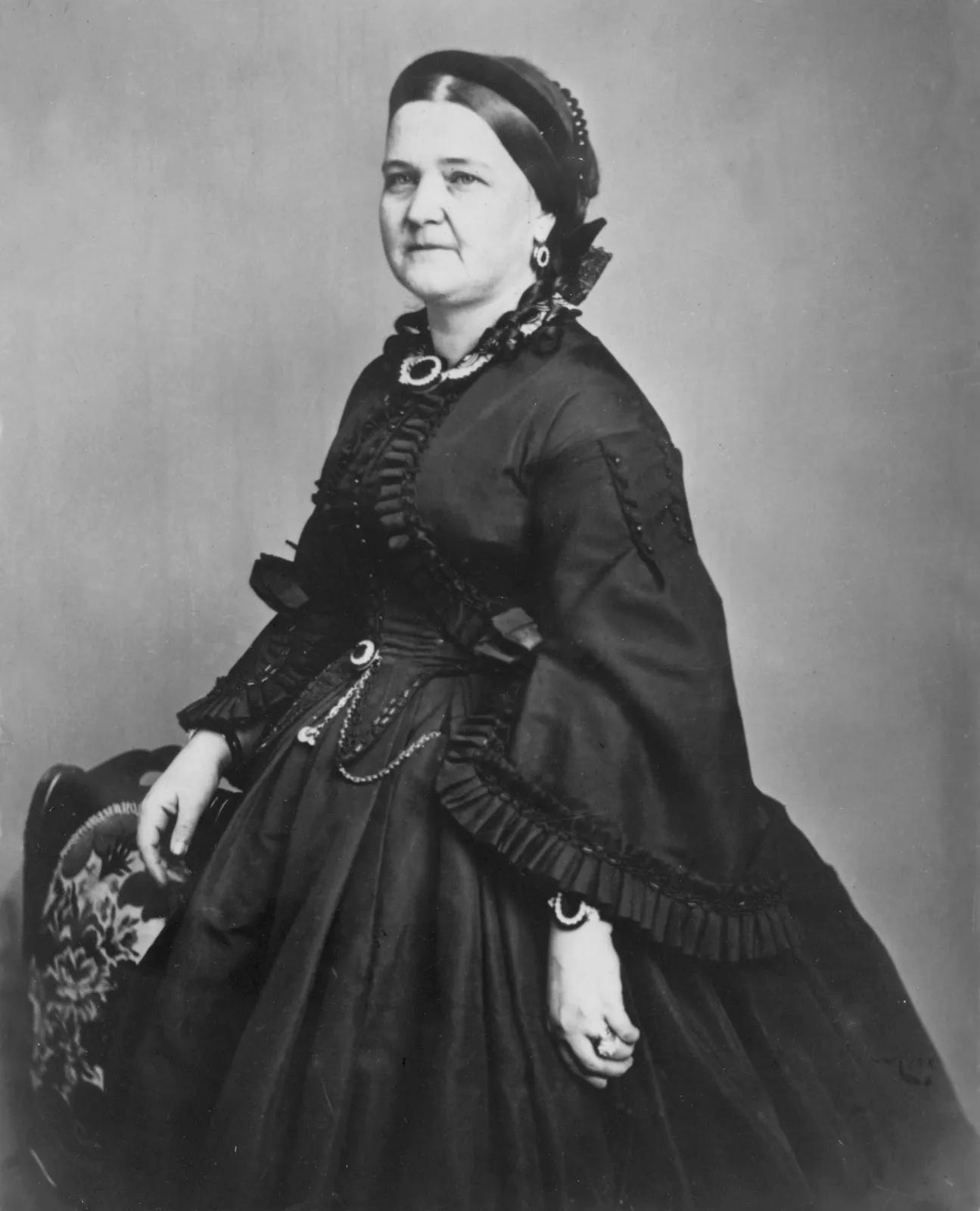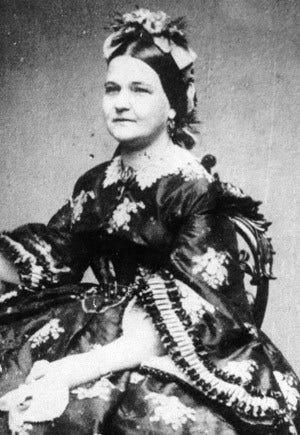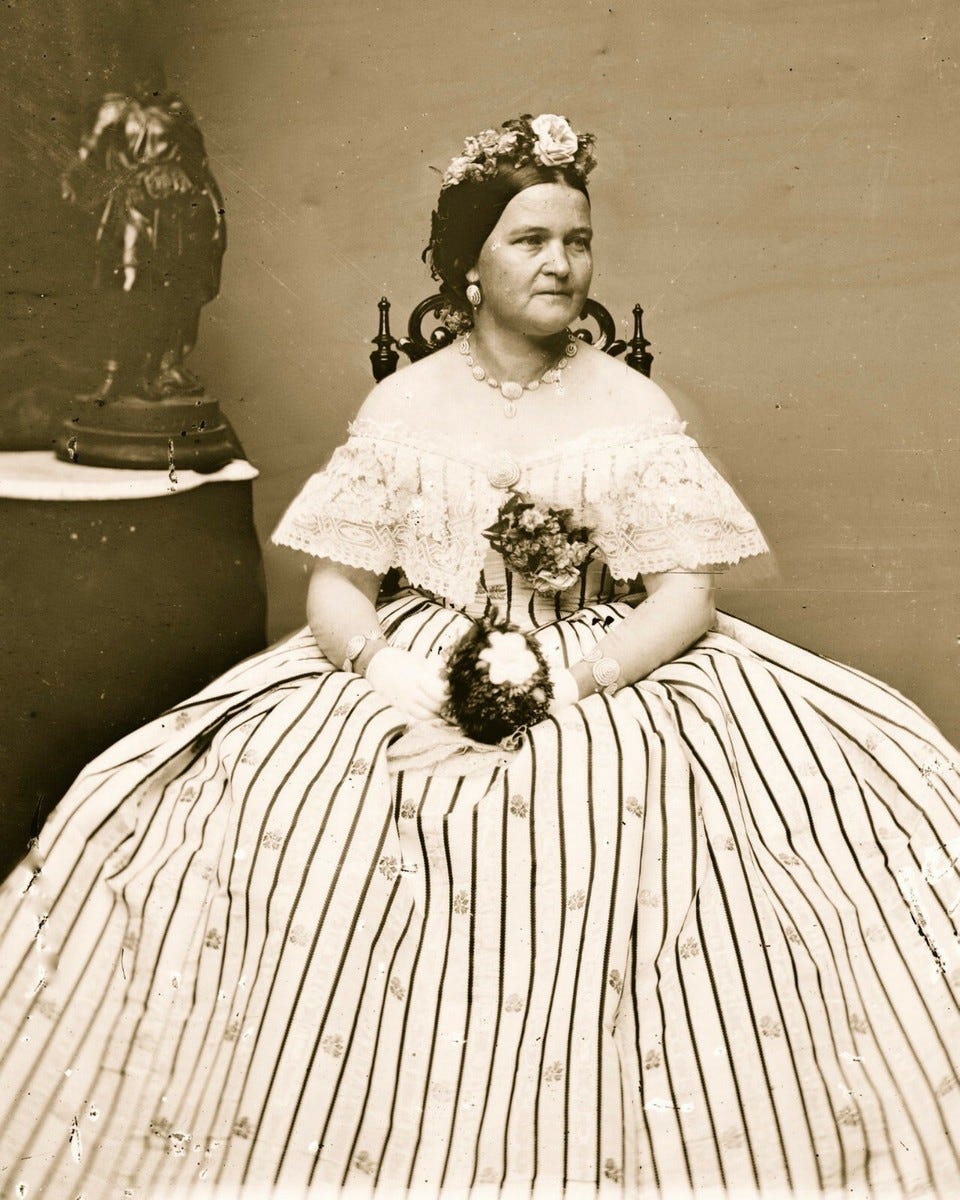Mary Todd Lincoln Wasn’t ‘Crazy’
She was a neglected daughter, and, later, a bereaved mother.
This week, I discovered an article on a website called President Lincoln’s Cottage. It mentions a piece published in The Washington Post which bears the title, “Mary Lincoln wasn’t ‘crazy.’ She was a bereaved mother.”
I agree with the title—and am grieved that such an article is necessary. It was written by Callie Hawkins, who had been working at Abraham Lincoln’s Cottage for ten years when, tragically, her baby was stillborn.
It was not enough that she was grieving her lost child. Familiar with Mary Lincoln’s story, she was afraid that she would be perceived by others as ‘crazy’ because of the time that she spent grieving.
Mary Lincoln’s grief began in childhood, when she lost her mother, but it was after she began to lose her children that her brokenness became more visible—and more aggressively criticized. She even contacted spiritualists. Already a reckless shopper, she decided to purchase more things.
The Washington Post article comments of her husband:
President Lincoln felt these losses deeply, too, but he expressed it in more socially acceptable ways, like throwing himself into work, locking himself in his office or secretly visiting the crypt that temporarily held his son’s coffin at night. In a sexist society, his grief was viewed as a more heroic “melancholy” than Mary’s, who was dismissed as self-absorbed or insane — a stereotype that persists to this day.
More socially acceptable ways. In the three books that I’ve read so far about the Lincolns, it is Abraham whose melancholy is perceived as normal and even heroic. Only in the book Mrs. Lincoln and Mrs. Keckly by Jennifer Fleischner is Mary Lincoln given a gentler portrayal: that of a broken soul born into the wrong time.
Click here to read the Washington Post’s article.
Mary, Mary, Quite Contrary
It’s said that history is written by the victors. While I don’t wish to believe that all historical outcomes we know of were composed in this spirit, one thing is for certain.
In 2025, we enjoy great advantages when it comes to learning. Not only are books more readily accessible for scholars (or simply people who wish to learn). If used with caution, seeking credible sources and cross-referencing, the Internet can provide us with many answers. We hold the world in the palm of our hands; we need only learn how to use it.
With such great power readily accessible, it’s no wonder that so many of us have committed our free time to digging truth out of texts written by ‘victors.’ By means of patient study, reading, and preparing to be wrong, we search for the truth. This includes seeking the truth about people who’ve been painted unfairly, based on the standards of their time.
Mind, I’m not saying that Mary was necessarily the gentlest of hostesses. I can’t claim, either, that everything negative written about her is wrong. At the end, I have neither the sources nor the talent to clear someone’s name and set history as we know it to rights.
I do have an opportunity to share my own thoughts. I’m not alone in perceiving an imbalance in the lore of our great President, Abraham Lincoln.
It’s true: there’s much about the Lincoln family that I don’t know. I’ve been to the museum near Ford’s Theater; I’ve seen that tower of books about his life. It’s not possible that I can read them all, but the first one I reached for this year disappointed me.
A Bone to Pick with Carnegie
It started with a friend’s copy of Lincoln: The Unknown by Dale Carnegie. He is a famous author who has become a staple in the literary canon. From his book, I hoped to learn things about the President, or be inspired to write an article. The book succeeded in that goal, but my research was driven by disappointment in how Carnegie wrote about Mary Lincoln, the President’s wife.
Lincoln: The Unknown seems, at first glance, to be a sensible narrative. Its length is not too overwhelming for younger readers. Style-wise, it is excellent, capturing Lincoln and portraying him as a hero. I felt that this was achieved at the expense of the woman to whom he was married.
By the time I finished that book, I could not say that I enjoyed it. I would never recommend it to someone who is just learning about that great President. Carnegie was determined to make Mary look as bad as he could.
It’s not possible that she could be perfect—no human being ever is. Neither is any human naturally the villain from every angle.
Lincoln: The Unknown consistently paints Mary in a negative light. First, she is the stalkerish, spurned lover. She’s a selfish woman who coerced a man into a miserable marriage. Immediately after this, she’s still selfish—but now she is a nagging wife, who goes out of her way to embarrass her high-profile spouse.
I do not justify the behaviors that have been described by those who knew Mary Lincoln. If it is true that she chased her husband into the street with a knife, we can only imagine what took place behind closed doors. In 2025, though, negative claims should be balanced with research and rational thinking.
The More Things Change…
We now know that certain disorders can cause behavior such as hers (irritability, manic shopping, obsessiveness). Modern historians suggest that she suffered from many things, including bipolar disorder.
This is not an excuse for knife-brandishing. However, a reasonable person will know that it makes a difference. Only recently have we begun to see mental health for what it is.
What troubles me about Carnegie’s presentation of her is that she’s given no opportunity to redeem herself. He does not mention how Mrs. Lincoln volunteered at hospitals during the war, helping wounded soldiers. He does not express sympathy for the pain she felt when her children died. Instead, he slanders her as an ambitious woman who did not know her place.
When I returned Lincoln: The Unknown to the friend from whom I borrowed it, I spotted another book on the same shelf: Mrs. Lincoln and Mrs. Keckly by Jennifer Fleischner.
Carnegie had mentioned, sparingly, that Mary developed a trusting friendship with Lizzy Keckly, a freed Black woman who had become a talented dressmaker for the important ladies of Washington. Fleischner tells this story in detail, and she does include pieces of information about Mary’s background that could explain her behavior.
Fleischner’s book is honest about Mary Todd’s flaws, beginning in childhood. She is honest about all of these tidbits. It’s amazing the difference that a writer’s tone can make! She managed to sound objective and sympathetic. Is this because Mrs. Lincoln and Mrs. Keckly was written by a woman? Is it because more time had passed since the subjects of that book lived?
Mary Todd was a ‘loud child’ in an age when children were expected to be seen, not heard. Later, as a young woman, Mary Todd was still loud—and also, a shameless flirt. Having been born into a family of good name, she enjoyed her own ‘Season’ and had no shortage of suitors.
By the end of Mrs. Lincoln and Mrs. Keckly, the impression I had was this: ambitious Mary Todd was born at a time when there were few ways for ambitious women to achieve anything. Her ambitions were political, and a good marriage was Mary’s only option. She could certainly never run for office.
Knowing all of this, is it really such a surprise that, meeting a man she believed would make it in politics, she pushed hard for that union?
Dreams of the White House
Mary Todd’s dreams began when she was young. Jennifer Fleischner recounts something that Mary, as a child, said to her father, Robert:
Mary’s earliest political ambitions were tied to her father's success before they were tied to her husband’s. In 1832, when she was twelve, she is supposed to have “begged” Robert Todd to run for President because she wanted to live in the White House.
Mary knew what she wanted when she asked her father to run for President. She was being brought up in a household where politics were discussed at the dinner table. Doubtlessly, she knew about the ‘hot issues’ of the day.
Carnegie writes about young Mary Todd’s ambitions in less flattering words. Note the difference in tone:
Mary was possessed of a high and haughty manner, an exalted opinion of her own superiority, and an abiding conviction that she would one day marry a man who would become President of the United States. Incredible as it seems, she not only believed that, but she openly boasted of it.
He writes about Mary’s political ambition in such a way that her dream is painted as shockingly evil. I suppose that, in her lifetime, such an ambition could seem sinister.
Mary Todd’s flawed behavior would have been influenced by fear of abandonment that began in her childhood. Her mother died of childbirth complications when Mary was only six.
After this loss, Mary sought a maternal figure in her older sister, Elizabeth. She also sought a mother in Mammy Sally, one of the slaves in the Todd home. It was not uncommon for children of slave-owning families to become close with the slaves.
Mary and Mammy Sally developed such a trusting bond that Mammy Sally confided to Mary a dangerous secret. She had been helping runaway slaves who stopped at the Todd home, offering them food and rest as they fled lives of bondage.
Young Mary did not get Mammy Sally into trouble about this, even though she could have. (This is a detail that Dale Carnegie failed to mention). Instead, she offered to take food to a fleeing slave. In her youth, she believed that this would be perceived as good. Mammy Sally explained that runaway slaves were afraid of recapture. The sight of even a white child could cause the man great fear.
Mary’s shortcomings as a wife should be balanced with details like this. Rather than painting her as a manipulative woman who bullied Lincoln into marriage, we should recall that she had moments of compassion. It is important to do this, because she is a significant figure in American history.
He’s Also the Problem
I’m not naive—by all accounts, the Lincolns’ marriage does not seem to have been happy. A lot of drama surrounded their engagement and, eventually, their vows. Before we blame Mary’s temper for all of it, I would remind readers that Abraham Lincoln’s melancholy existed before he ever met Mary.
Lincoln struggled with depression. He’d been born into poverty, and he also lost his mother as a child. He was never a happy man, and while disagreements with Mary would have worsened matters, she was not the sole cause of his misery.
Look at the context; they lived during the Civil War. How could a serious writer try to blame his wife for all of his unhappiness?
Abraham Lincoln did apparently fall ‘out of love’ with Mary Todd, during their courtship phase. This was after they exchanged several letters. Something she wrote revealed an angle of her personality that he didn’t like.
He decided that he could not happily live with her, which is valid. No one should feel obligated to marry someone they don’t think they could live with. Yet he married her, anyway.
My impression is that their relationship was mutually toxic. Abraham Lincoln had depression. Unlike Mary, he’s portrayed as someone who seldom lost his patience. He’s lauded as someone who agreed to marry Mary in order to preserve his honor. He then settled to live an apparently miserable life with a woman who could never shut up.
The dynamics of their marriage seem to have been odd, as well. Fleischner suggests that Mary sought men who would present as a replacement father figure. She found the perfect example in Lincoln:
Lincoln, who was nine years older and possessed the air of a much older man, had these qualities in spades; he moved as if from a central core of being. In him, Mary might have sought the father she never quite had: the striving politician and lawyer whose ambitions were fulfilled and the tenderhearted and steady provider whose home life centered on her.
I sense an imbalance between their personalities, but not in the traditional sense. Mary might have sought in him a father figure. This awkward dynamic meant their relationship, already imperfect, was bound to end in disaster. But it wasn’t all because of her.
What I’m trying to ask with all of this is, Why does Mary seem to get all of the blame for their broken marriage? While we’re at it, Why was Mary offered so little sympathy, even after her husband was killed by her side?
It seems cruel, because the stereotype is perpetuated to this day.
In my next post about Mary Lincoln, I will write more about her time as First Lady. I’ll write about the good things that she did. She did indulge in shopping sprees and create outstanding debt, but that should not be her sole legacy.
She was not all bad. Being ambitious should no longer be a sin in a woman. Let us begin, then, to change how ambitious women in the past are perceived.
It is only just, so that we can move forward as a society.











An important subject, brilliantly argued. Mary, like many so-called “hysterical”women from history, is unquestionably the victim of misogynistic tropes. Perhaps to draw attention away from Abraham’s sexuality? Really enjoyed this. Thank you.
Oh wow! I can’t wait to read this, Mary Todd is such a unique character of history.